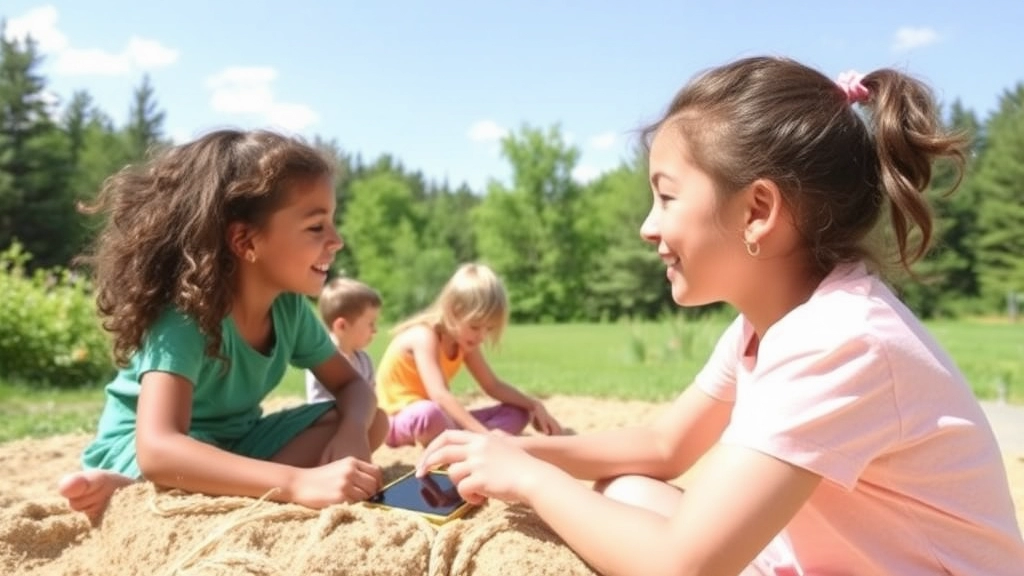Therapeutic Summer Camps
When it comes to therapeutic summer camps, there are various types designed to support children’s emotional and mental well-being. These camps offer a unique blend of therapy and fun activities, creating an environment where kids can thrive. From adventure-based camps to those focused on specific therapies, there’s something for every child’s needs.
Benefits of Attending Therapeutic Summer Camps
Attending therapeutic summer camps can bring numerous benefits. Children gain confidence, build social skills, and develop coping mechanisms, all while enjoying a memorable summer experience. With a range of activities tailored to their needs, these camps provide a supportive space for growth and healing. Choosing the right camp can make a significant difference in your child’s life.
Types of Therapeutic Summer Camps
Ever wondered if there’s a summer camp that can help your child grow emotionally and socially while having a blast? Well, you’re in luck! Therapeutic summer camps are designed to do just that. Let’s dive into the various types available and see which one might be the perfect fit for your child.
Traditional Therapeutic Camps
These camps offer a mix of traditional camp activities like hiking, swimming, and arts and crafts, but with a therapeutic twist. They usually have trained therapists and counsellors on staff who integrate therapy sessions into the daily routine.
- Key Features:
- Traditional camp activities
- Integrated therapy sessions
- Focus on emotional and social growth
Adventure Therapy Camps
If your child loves the great outdoors and thrives on adventure, this might be the type for you. Adventure therapy camps use activities like rock climbing, white-water rafting, and wilderness expeditions to help kids build confidence and resilience.
- Key Features:
- Outdoor adventure activities
- Focus on building confidence and resilience
- Therapy through experiential learning
Specialised Therapeutic Camps
These camps are tailored for children with specific needs, such as ADHD, autism, or behavioural issues. They offer specialised programmes and activities designed to address these unique challenges.
- Key Features:
- Specialised programmes for specific needs
- Tailored activities
- Expert staff trained in specific therapies
Family Therapeutic Camps
Sometimes, the whole family needs a bit of therapy. These camps offer programmes where parents and siblings can participate alongside the child. It’s a great way to strengthen family bonds and improve communication.
- Key Features:
- Family-inclusive programmes
- Activities for all family members
- Focus on improving family dynamics
Day Therapeutic Camps
Not ready for an overnight commitment? No worries. Day therapeutic camps offer all the benefits of therapeutic activities and sessions but allow your child to return home each evening.
- Key Features:
- Daytime activities only
- No overnight stay
- Convenient for local families
Residential Therapeutic Camps
These are the full-on, sleepaway camps where kids stay for several weeks. They offer a more immersive experience and can be particularly beneficial for children who need a bit more time to adjust and grow.
- Key Features:
- Overnight stay for several weeks
- Immersive experience
- Extended therapy sessions
Real Talk
Choosing the right camp can feel overwhelming, right? But knowing the different types of therapeutic summer camps out there can make it a bit easier. Whether your child needs a bit of adventure, specialised care, or just a place to feel understood, there’s a camp out there for them. So, what’s your next move? Take a closer look at these options and find the perfect fit for your child. Trust me, the right camp can be a game-changer.
For more information on therapeutic camps, check out our guide on Top Summer Camps for Troubled Youth. If you’re considering a more traditional camp experience, you might find our list of Complete Summer Camp Packet helpful.
Benefits of Attending Therapeutic Summer Camps

Thinking about a therapeutic summer camp for your child? Wondering if it’s worth it? Let’s dive in.
Why Consider a Therapeutic Summer Camp?
First up, therapeutic summer camps aren’t just your average camps. They’re designed to help kids with specific needs. Whether it’s behavioural issues, emotional struggles, or social skills, these camps have got it covered.
Here’s why they’re a game-changer:
- Personal Growth
- Kids get a safe space to work on themselves.
- They learn coping strategies for real-life challenges.
- Boosts self-esteem and confidence.
- Social Skills
- Making friends can be tough. Here, everyone’s in the same boat.
- Structured activities help kids learn how to interact.
- They practice teamwork and communication.
- Emotional Support
- Professional therapists are on hand.
- Kids can talk about their feelings without judgement.
- They learn to manage emotions better.
- Physical Health
- Activities keep them active and healthy.
- Outdoor adventures get them moving.
- Balanced meals and routines promote good habits.
- Academic Support
- Some camps offer tutoring or educational activities.
- Keeps their brains engaged over the summer.
- Helps them catch up or get ahead for the next school year.
Real Stories, Real Impact
Take Sarah, for example. She struggled with anxiety and had a hard time making friends. After a summer at camp, she came back with a smile and a bunch of new buddies. Her mum couldn’t believe the change.
Or Tom, who had ADHD. He learned strategies to focus better and manage his energy. His teachers saw a noticeable improvement when he returned to school.
What’s in it for You?
As a parent, you’ll see your child grow in ways you didn’t think possible. They’ll come back more independent, more confident, and more equipped to handle life’s ups and downs.
Bottom line: Therapeutic summer camps offer a unique blend of fun and therapy. They’re not just about having a good time; they’re about making lasting changes.
Activities Offered at Therapeutic Summer Camps
Hey, let’s talk about the activities offered at therapeutic summer camps. I know, you might be wondering, “What exactly do these camps offer that makes them so special?” Well, let’s dive in.
Why Activities Matter
First off, the activities at therapeutic summer camps are not just for fun â they serve a purpose. These activities are designed to help kids and teens develop social skills, build self-esteem, and manage emotions. It’s like hitting the gym, but for your mind and soul.
Types of Activities
So, what kind of activities can you expect? Here’s a breakdown:
- Outdoor Adventures: Think hiking, canoeing, and rock climbing. These activities get kids out of their comfort zones and into nature.
- Creative Arts: From painting to music, creative arts help kids express themselves in ways they might not be able to with words.
- Team Sports: Football, basketball, or even a friendly game of tag. Team sports teach cooperation, leadership, and how to handle winning and losing.
- Mindfulness and Yoga: These activities focus on mental well-being, teaching kids how to relax and stay present.
- Therapeutic Sessions: Group therapy, one-on-one counseling, and peer support groups. These sessions are the backbone of the camp, helping kids work through their issues in a supportive environment.
Real Talk: What Parents Worry About
You might be thinking, “Will my child actually enjoy these activities?” or “What if they feel out of place?” Trust me, these camps are designed to make everyone feel included. The staff are pros at creating a welcoming environment where every kid can find something they love.
Success Stories
I’ve heard countless stories of kids who were initially hesitant but ended up loving the experience. One parent told me about their son who was shy and withdrawn. After a summer of team sports and group therapy, he came back more confident and open. That’s the power of these activities.
Why It Works
These activities work because they blend fun with therapy. Kids are more likely to open up and engage when they’re in a relaxed, enjoyable setting. Plus, the variety of activities ensures there’s something for everyone, whether they’re athletic, artistic, or somewhere in between.
For more information on how to make the most of your summer camp experience, check out our Ultimate Guide to Summer Camp Sleepaway Fun. And if you’re interested in specific activities, don’t miss our article on Fun Activities at Summer Camp.
How to Choose the Right Therapeutic Summer Camp

Choosing the right therapeutic summer camp can feel like navigating a maze.
What if you pick the wrong one?
What if your child doesn’t get the help they need?
Let’s break it down so you can make the best choice for your child.
Understand Your Child’s Needs
First things first, know what your child needs.
Is it behavioural therapy? Emotional support? Social skills development?
Here’s a quick checklist to keep in mind:
- Type of therapy: Does the camp specialise in cognitive-behavioural therapy, art therapy, or something else?
- Age group: Is the camp tailored for your child’s age?
- Duration: How long is the camp? A week? A month?
Research the Camp’s Reputation
Don’t just rely on the camp’s website. Dig deeper.
- Read reviews: Look for testimonials from other parents.
- Ask for references: Speak directly to families who’ve been there.
- Check credentials: Make sure the staff are qualified professionals.
Visit the Camp
If possible, visit the camp in person.
- Tour the facilities: Are they clean and safe?
- Meet the staff: Are they approachable and experienced?
- Observe a session: See how they interact with the kids.
Assess the Activities
What will your child be doing all day?
- Therapeutic activities: Are there individual and group therapy sessions?
- Recreational activities: Are there fun activities like swimming, hiking, or arts and crafts?
- Skill-building: Are there opportunities for your child to learn new skills?
Check Safety and Health Standards
Safety first, always.
- Medical staff: Is there a nurse or doctor on-site?
- Emergency procedures: What’s the plan if something goes wrong?
- Dietary needs: Can they accommodate allergies or special diets?
Consider the Cost
Therapeutic summer camps can be pricey.
- Tuition fees: What’s the cost, and what does it include?
- Additional costs: Are there extra fees for activities or materials?
- Financial aid: Are there scholarships or funding options available?
Get Your Child’s Input
Your child’s opinion matters.
- Discuss the options: Show them the camps you’re considering.
- Get their feedback: What excites them? What worries them?
Trust Your Gut
At the end of the day, trust your instincts.
- Comfort level: Do you feel good about the camp?
- Confidence: Do you believe this camp will help your child grow?
Choosing the right therapeutic summer camp doesn’t have to be overwhelming.
Keep these tips in mind, and you’ll find the perfect fit for your child’s needs.
Funding and Scholarships for Therapeutic Summer Camps
Alright, let’s talk about something that’s on every parent’s mind: how to fund your child’s therapeutic summer camp experience. Therapeutic summer camps can be a game-changer, but they can also be pricey. So, how do you make it happen without breaking the bank? Here’s the lowdown.
The Real Questions
- “Can I afford this?”
- “Are there scholarships available?”
- “What are my funding options?”
These are the worries we all face. The good news? There are ways to make therapeutic summer camps more affordable.
Scholarships and Grants
First up, scholarships and grants. Many camps offer financial aid to families who need it. Here’s what you need to know:
- Application Deadlines: Most camps have specific deadlines for scholarship applications. Mark your calendar!
- Documentation: Be prepared to provide financial documents. Camps want to know your genuine need.
- Early Bird Gets the Worm: Apply as early as possible. Funds are often limited and awarded on a first-come, first-served basis.
Payment Plans
Next, let’s talk payment plans. Some camps offer the option to break down the cost into manageable chunks. This can be a lifesaver.
- Monthly Installments: Spread the cost over several months.
- Custom Plans: Some camps might even tailor a plan to fit your financial situation. Don’t hesitate to ask.
Non-Profit Organisations
Now, non-profit organisations. There are groups out there whose mission is to help kids get the therapy they need.
- Local Charities: Check out local charities and community groups. They often have funds set aside for this very purpose.
- National Organisations: Larger organisations like the YMCA or Boys and Girls Clubs might have resources or connections to help.
Fundraising
Feeling entrepreneurial? Fundraising can be a fantastic way to gather the necessary funds.
- Crowdfunding: Platforms like GoFundMe can help you tap into your network.
- Community Events: Organise a bake sale, car wash, or fun run. It’s amazing how quickly small efforts can add up.
Employer Assistance
Don’t overlook your employer. Some companies offer assistance for educational and therapeutic programs for their employees’ children.
- Employee Assistance Programs (EAP): Check if your company has an EAPâit might cover part of the camp cost.
- Corporate Sponsorships: Sometimes, companies are willing to sponsor a child’s camp experience. It never hurts to ask.
Government Programs
Government programs can also be a resource, though they vary widely by location.
- Disability Grants: If your child has a diagnosed disability, there may be specific grants available.
- State Programs: Look into state-specific programs that support children’s therapeutic needs.
Real Talk
I get it, navigating all these options can feel overwhelming. But remember, you’re not alone. Many parents have walked this path and found ways to make it work. For more tips on how to streamline your application process, check out our guide on streamlining your summer camp application form. And if you’re still exploring options, our guide to affordable summer camps for 5-year-olds might be helpful.
Parental Involvement in Therapeutic Summer Camps

Ever wondered how much you should be involved in your child’s therapeutic summer camp experience?
Let’s dive in.
Why Parental Involvement Matters
First off, your involvement can make or break the experience.
Kids feel more secure knowing their parents are engaged.
But how much is too much?
Finding the Balance
You don’t want to hover, but you also don’t want to be MIA.
Here’s a sweet spot:
- Stay Informed: Know the camp’s schedule and activities.
- Regular Check-ins: Weekly calls or emails to see how things are going.
- Feedback Loop: Be open to feedback from camp staff about your child’s progress.
Ways to Be Involved
Here’s how you can be part of the journey without being overbearing:
- Pre-Camp Prep: Help your child pack and talk about what to expect.
- Communication Plan: Set up a schedule for calls or video chats.
- Support Network: Join a parent support group linked to the camp.
- Post-Camp Review: Discuss what they learned and how they felt.
Stories from the Trenches
I remember a parent who was super anxious about sending their kid to camp.
They decided to write letters every week.
The kid loved it.
It became a highlight of their camp experience.
What the Experts Say
Experts agree: balanced parental involvement boosts the camp’s effectiveness.
It helps reinforce the skills and coping mechanisms learned at camp.
Final Thoughts
Your involvement is key.
Just remember to strike that balance.
Your child will thank you for it.
Success Stories from Therapeutic Summer Camp Alumni
Ever wondered if those therapeutic summer camps actually work? I mean, do they really help kids and teens overcome their struggles? You’re not alone. Many parents are sceptical, and rightly so. But let me tell you, the success stories from therapeutic summer camp alumni are nothing short of inspiring.
Real Transformations
Let’s dive into some real transformations. Imagine a young lad named Jake, who struggled with severe anxiety. His parents were at their wit’s end, trying everything from traditional therapy to medication. They were desperate for a solution. Enter the therapeutic summer camp. Within weeks, Jake was not only managing his anxiety but also thriving. He made friends, participated in activities, and even took on leadership roles. His parents couldn’t believe the change.
Building Confidence
Then there’s Emily, a teenager battling low self-esteem and social isolation. Before attending the camp, she barely spoke to anyone outside her immediate family. The camp’s supportive environment and structured activities worked wonders. Emily returned home with a newfound confidence, eager to engage in social settings and even joined her school’s drama club.
Coping Skills
How about Sam, who had anger management issues? His outbursts were affecting his school life and relationships. The camp’s tailored programmes focused on emotional regulation and coping skills. By the end of the summer, Sam had learned to channel his anger constructively. His teachers and friends noticed the significant improvement, and Sam himself felt a sense of control he never had before.
Long-Term Benefits
The benefits aren’t just short-term. Many alumni report long-lasting changes. They carry the skills and confidence they gained at camp into their adult lives. It’s not just about surviving the summer; it’s about thriving long after.
Bullet Points for Quick Wins
- Anxiety Management: Camps offer structured environments that help kids like Jake manage anxiety effectively.
- Social Skills: Activities designed to boost confidence and social interaction can turn introverts like Emily into social butterflies.
- Emotional Regulation: Tailored programmes help kids like Sam learn to control their emotions, benefiting them long-term.
- Leadership Opportunities: Camps often provide leadership roles, helping kids feel valued and responsible.
Personal Stories
I remember chatting with a parent over coffee, who shared how her son, a camp alumnus, went on to become a camp counsellor himself. He wanted to give back and help other kids the way he was helped. It’s stories like these that make you realise the profound impact these camps can have.
The Bottom Line
Success stories from therapeutic summer camp alumni are not just feel-good tales. They are real, tangible proof that these camps can make a significant difference. Whether it’s managing anxiety, building social skills, or learning to control emotions, the transformations are genuine and lasting.
Preparing Your Child for Therapeutic Summer Camp

Worried about sending your child to a therapeutic summer camp?
You’re not alone.
Many parents feel a mix of hope and anxiety.
Let’s break it down.
Why the Worry?
- Will my child fit in?
- What if they get homesick?
- Is it really going to help?
Simple Steps to Prep Your Child
- Talk It Out
- Sit down and chat.
- Explain what the camp is all about.
- Highlight the fun and the benefits.
- Visit the Camp
- If possible, take a tour.
- Familiarise your child with the surroundings.
- Meet the staff and ask questions.
- Pack Together
- Let your child help with packing.
- Include comfort items like a favourite toy or blanket.
- Pack a few photos from home.
- Role Play Scenarios
- Act out different camp situations.
- What to do if they feel lonely.
- How to make new friends.
Building Confidence
- Positive Reinforcement: Keep the conversation upbeat.
- Encourage Independence: Let them handle small tasks on their own.
- Set Expectations: Be clear about what they can expect and what’s expected of them.
Stories from the Campfire
Remember Sarah?
She was super anxious about camp.
After a week, she was leading group activities.
Her mum couldn’t believe the transformation.
Checklist for Parents
- Medical Needs: Ensure the camp knows about any allergies or medications.
- Emergency Contact: Double-check they have your correct info.
- Communication Plan: Agree on how often and when you’ll communicate.
Preparing your child for a therapeutic summer camp doesn’t have to be stressful.
With the right steps, you can turn anxiety into excitement.
Your child will thank you.
And you’ll feel more at ease.
Ready to get started?
Safety and Health Standards in Therapeutic Summer Camps
When you’re thinking about sending your child to a therapeutic summer camp, safety and health standards are probably top of mind. You might be wondering, “Is my child going to be safe? What measures are in place to protect their health?” Let’s dive into what you need to know to put your mind at ease.
Why Safety and Health Standards Matter
First off, why are safety and health standards so crucial in therapeutic summer camps? Well, these camps are designed to support kids with various emotional, behavioural, or mental health needs. That means the stakes are a bit higher compared to regular summer camps. The environment needs to be not just fun but also incredibly safe and supportive.
Key Safety Measures
1. Staff Training and Qualifications:
- Qualified Professionals: Camps should have licensed therapists, counsellors, and medical staff.
- First Aid and CPR: All staff should be trained in first aid and CPR.
- Background Checks: Comprehensive background checks are a must for all employees.
2. Supervision:
- Low Staff-to-Camper Ratios: Ensures each child gets the attention they need.
- 24/7 Supervision: There should always be someone watching over the kids, day and night.
3. Emergency Procedures:
- Emergency Plans: Camps should have clear plans for medical emergencies, natural disasters, and other crises.
- Communication: Parents should be informed promptly if any issues arise.
Health Standards
1. Medical Facilities:
- On-Site Clinics: Many camps have on-site medical facilities to handle minor injuries and illnesses.
- Access to Hospitals: Camps should be located near hospitals for more serious medical needs.
2. Medication Management:
- Secure Storage: Medications should be stored securely and administered by trained staff.
- Scheduled Administration: Medications should be given at the correct times, without fail.
3. Nutrition:
- Balanced Meals: Camps should offer nutritious meals tailored to the dietary needs of campers.
- Allergy Management: Staff should be well-versed in handling food allergies and other dietary restrictions.
Real-Life Examples
I remember chatting with a mum who was super anxious about sending her son to a therapeutic summer camp. She was worried about everything from food allergies to how they’d handle a meltdown. After visiting the camp and seeing their meticulous safety and health protocols, she felt so much more at ease. Her son ended up having an amazing summer, and she couldn’t stop raving about the staff’s professionalism and care.
If you’re looking for more information on what to pack for your child’s camp experience, check out our Ultimate Guide: Things to Pack for Summer Camp. Additionally, for a comprehensive overview of various camp themes, visit our page on Summer Camp Themes: Creative to Tech-Savvy.
Resources for Finding Therapeutic Summer Camps
So, you’re thinking about sending your child to a therapeutic summer camp, but where do you even start?
Finding the right camp can feel like looking for a needle in a haystack.
But don’t worry, I’ve got your back.
Let’s break it down.
Why You Need the Right Resources
First off, you need to know why finding the right resources is crucial.
You want your child to have a positive and transformative experience, right?
The right camp can make all the difference.
Online Directories
The internet is your friend here.
There are several online directories that specialise in therapeutic summer camps.
- CampResource.co.uk: A comprehensive directory that lets you filter by camp type, location, and even specific needs.
- TherapeuticCamps.org: Another solid option that offers detailed reviews and ratings.
Word of Mouth
Sometimes, the best recommendations come from people you trust.
Ask around.
- Friends and Family: They might have firsthand experience or know someone who does.
- Support Groups: If you’re part of any parent support groups, both online and offline, these can be gold mines for recommendations.
Professional Recommendations
Don’t underestimate the power of professional advice.
- Therapists and Counsellors: They often have a network of trusted camps.
- School Staff: Teachers and school counsellors can also provide valuable insights.
Social Media and Forums
Social media isn’t just for cat videos and memes.
It can be a powerful tool for finding the right therapeutic summer camp.
- Facebook Groups: There are specific groups dedicated to parents looking for therapeutic camps.
- Reddit: Subreddits like r/Parenting or r/SpecialNeeds can be incredibly helpful.
Books and Publications
Believe it or not, some books and magazines specialise in this area.
- Parenting Magazines: They often feature articles and ads for therapeutic camps.
- Books on Special Needs: These can include resource lists in the back.
Check the Credentials
Once you’ve got a list of potential camps, it’s time to dig deeper.
- Accreditations: Look for camps accredited by recognised organisations.
- Reviews and Testimonials: Real stories from real parents can give you a clearer picture.
Final Thoughts
Finding the right therapeutic summer camp might seem daunting, but it’s totally doable.
Use these resources to make an informed choice.
Trust me, the effort will pay off when you see the positive impact on your child.
For more information on affordable options, check out our guide on Gateway Summer Camp. If you’re looking for specific themes, our article on Creative Summer Camp Themes might be helpful.
FAQs about Therapeutic Summer Camps
What is a therapeutic summer camp?
A therapeutic summer camp is a specialized camp designed to help children with specific needs such as behavioral issues, emotional struggles, or social skills. These camps provide a safe and supportive environment for personal growth and development.
How do therapeutic summer camps benefit my child?
Therapeutic summer camps offer numerous benefits, including:
- Personal Growth: Children learn coping strategies and boost their self-esteem.
- Social Skills: Structured activities help kids make friends and practice teamwork.
- Emotional Support: Professional therapists are available to help children manage their emotions.
- Physical Health: Activities keep them active and healthy, promoting good habits.
- Academic Support: Some camps offer tutoring to keep their brains engaged over the summer.
How do I choose the right therapeutic summer camp?
Choosing the right camp involves several steps:
- Understand Your Child’s Needs: Identify whether they need behavioral therapy, emotional support, or social skills development.
- Research the Camp’s Reputation: Read reviews, ask for references, and check staff credentials.
- Visit the Camp: Tour the facilities, meet the staff, and observe a session if possible.
- Assess the Activities: Ensure there are both therapeutic and recreational activities.
- Check Safety and Health Standards: Confirm the presence of medical staff and emergency procedures.
- Consider the Cost: Look at tuition fees, additional costs, and financial aid options.
- Get Your Child’s Input: Discuss the options with your child and get their feedback.
How involved should I be in my child’s camp experience?
Parental involvement is crucial but should be balanced. Here are some tips:
- Stay Informed: Know the camp’s schedule and activities.
- Regular Check-ins: Maintain weekly calls or emails to check on progress.
- Feedback Loop: Be open to feedback from camp staff about your child’s progress.
How can I prepare my child for a therapeutic summer camp?
Preparation is key to easing your child’s anxiety:
- Talk It Out: Explain what the camp is about, highlighting the fun and benefits.
- Visit the Camp: Take a tour to familiarize your child with the surroundings.
- Pack Together: Let your child help with packing and include comfort items.
- Role Play Scenarios: Act out different camp situations to build confidence.
What should I pack for my child?
Include essential items and comfort items like a favorite toy or blanket. Make sure to pack any necessary medications and provide the camp with detailed medical information.
Can therapeutic summer camps help with academic skills?
Yes, some therapeutic summer camps offer tutoring or educational activities to keep your child’s brain engaged and help them catch up or get ahead for the next school year.
Are there financial aid options for therapeutic summer camps?
Many camps offer scholarships or funding options. It’s important to inquire about these when researching camps to find a suitable financial plan.
What if my child gets homesick?
Homesickness is common. Camps are equipped with strategies to help children cope, including regular communication plans with parents and supportive staff to ease their transition.
What kind of professionals work at therapeutic summer camps?
Therapeutic summer camps typically employ qualified professionals such as therapists, counselors, and medical staff to ensure a safe and supportive environment for all campers.
References
-
The Benefits of Therapeutic Summer Camps
-
Therapeutic Summer Camps for Troubled Teens
-
The Ultimate Guide to Summer Camp

